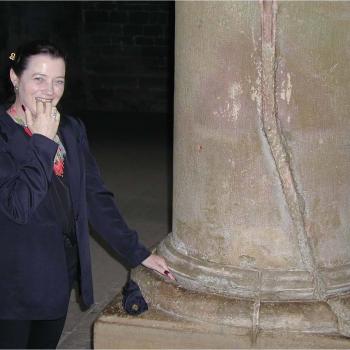Many of these people are sharing in the emerging "interspirituality" of our time, in which they weave together a tapestry of religious practices, often from a variety of religious traditions. For example, we find many Christians doing reiki healing touch and practicing Tai Chi and yoga; Jews going on Zen Buddhist retreats; Hindus learning about Jesus and seeing him as an avatar; Buddhists seeing Jesus as a Bodhisattva similar to the compassionate Buddha.
I am amazed at the dynamic breadth of our spirituality today. I pastor an historic white-steepled congregational church on Cape Cod. To the outside it looks rather traditional, but inside, we have classes in reiki and offer reiki healing touch treatments; we have members who do Tai Chi, Qi Gong, and yoga; and in a recent study group, participants shared about near death experiences and their varied images of the afterlife, ranging far beyond the heaven-hell dichotomy many people affirm. This is where the energy of certain types of Christianity is going, and we need to be attentive to the Spirit in lives both in and beyond the church.
To be loosely Christian is to see faith in terms of growth and expansiveness. It is to be willing to look for healing and wholeness in all its manifestations -- from progressives, emergents, Pentecostals, Pagans and Wiccans, Buddhists, Hindus, Muslims, and agnostics and atheists. God is witnessed everywhere and God is on the move, challenging us to be on the move as well.
You talk about the rigidity of many Christian doctrines and how that might inhibit real spiritual life. Which kinds of beliefs have you found most restrictive in your own life of faith?
I was raised in a fairly conservative small town Baptist church. I "came forward" -- that is, accepted Christ as my personal savior -- at a revival meeting when I was in fourth grade. I am grateful for my Baptist roots. I learned scripture and discovered Christ as a personal companion.
Yet, as I reached my teens, I outgrew the doctrinal aspects of my Baptist upbringing. The doctrines were too narrow. I couldn't imagine persons going to hell because they did not recite the right creeds or have a Damascus Road experience. I struggled with the us-them approach that denied truth and wisdom outside conservative Christian faith. I struggled with limited truth and salvation to just one, narrowly circumscribed way.
I discovered along the way the spiritual insights of Buddhists, Hindus, new agers, psychedelic adventurers, and seekers, and gained from encountering spiritual practices from other traditions, most especially in the practices of healing touch and meditation.
You address as well the need for identity and the relationship between identity and some boundaries. How is there a difference between "loosely Christian" and "loosely Buddhist" or "loosely Pagan" or any other kind of loosely? What still makes you Christian?
When I say "loosely," I am talking about a "how" as well as a "what." A loosely-held faith invites us to constant growth and opens us to healing and truth wherever it is found. I believe that wherever truth and healing are found, we discover the energy of love present in the life and teachings of Jesus Christ. A loosely-held Christianity is deeply and passionately Christ-centered, yet the Christ is the source of openness rather than closed-mindedness.
I am profoundly Jesus-centered and my relationship with Jesus has inspired me to be open to global wisdom while discovered new resources in my own faith tradition. On the path, I have discovered the earth-oriented faith of Celtic Christianity and now celebrate the changing seasons (solstice and equinox) with Christian-based services. I was inspired by Buddhist and Hindu meditation and that challenged me to discover the depths of Christian spiritual practices, ranging from centering prayer, creative visualizations, Quaker silence, and Taizé chanting. In discovering the energy of love in Jesus' healing ministry, I was inspired to learn -- and later become a master teacher -- of reiki healing prayer. I now integrate reiki with our church's healing ministry and our church now sponsors reiki healing circles.
My center is Christ-like and this center embraces wisdom and truth in ways that promote growth and hospitality toward otherness. Our spiritual energies grow and deepen as we encounter people who hold their religious traditions loosely -- whether Hindu, Buddhist, Muslim, Pagan, or Christian -- and are willing to grow in partnership with another in the quest for a faith that brings healing to ourselves and this good earth.
What do you most hope readers take away from your book?
I want readers to be able to affirm their own experiences -- such as "I am a person of faith," and "I am part of the Christian way" -- and yet become more open to growth, change, and diversity of religious experience. Too many people leave the church, assuming that Christianity is a strait jacket, inhibiting their spiritual journeys, and discouraging questions, and often asking them to believe the unbelievable simply because it is unbelievable (six-day creation, young earth, separation of faith and science, supernatural interventions to help God's chosen, heaven and hell, the threat of damnation to doubters and seekers).
I want to encourage seekers and pilgrims to bring their questions to their faith, to find communities that accept them with all their doubts, and welcome them to a faith large enough for whatever journeys they take.
I want readers to see themselves as part of an emerging, lively, growing faith, and discover that their own commitments and practices are helping to shape the faith of tomorrow.
Read an excerpt from Loosely Christian at the Patheos Book Club.




